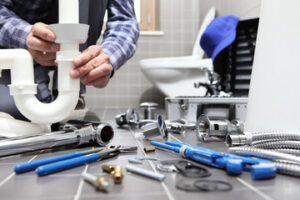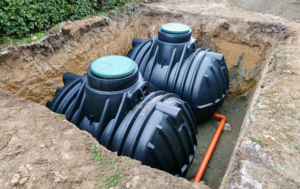Plumbers are responsible for installing, repairing and maintaining pipes that carry water, gas, sewage and drainage in homes and businesses. This involves working with a wide variety of tools and systems.

Plumbing is an excellent career choice for people who enjoy hands-on work and problem-solving. However, it’s important to know what to expect from a plumber before hiring one.
Sewer smells can be more than just a nuisance. They can be a sign of a serious problem with your plumbing that needs to be addressed as soon as possible. If left untreated, sewer odors can lead to health and safety issues for your family. The smelly, rotten egg-like scent of sewer gas comes from decomposing organic waste, which is often found in drains and sewer pipes.
When organic material breaks down in pipes, it emits a dangerous and toxic gas called hydrogen sulfide that gives off the infamous sewage smell. Hydrogen sulfide combines with other gases such as carbon dioxide, ammonia and methane to form sewer gas, which can be dangerous to breathe and may cause illness in your family if exposed for extended periods of time.
A plumber can fix most of the causes of a sewer smell, including leaking pipe joints, cracked pipes and damaged drain vents. Other signs of a sewer problem include multiple drains backing up, soggy or lush green spots in your yard and a smelly sewage smell throughout the house.
If the sewage smell is coming from just one drain, it’s likely because the P-trap underneath has dried out. A P-trap is a U-shaped pipe that connects to the drain on one end and to the sewer line on the other. It contains a small amount of water at all times, which acts as a barrier that prevents sewer gas from entering your home. If a P-trap is dry, a plumber can easily replace it with a new one.
The smell of sewage could also be caused by a clogged or broken drain clean-out cap. These caps protect the entrance to a sewer clean-out pipe by keeping rainwater, pests and debris from clogging the drain. If the cap is missing or broken, it’s easy for sewage to enter your home and cause a rotten egg smell.
In addition to fixing your drains, a plumber can install or repair ventilation systems to ensure that toxic gases are properly circulated and not released into your home. If you have an attic or crawlspace with vents that are blocked by insulation, debris or animal nests, a plumber can remove the blockage and restore proper air circulation to reduce odors.
Mold
Mold is a fungus that, when it gets out of control, causes unpleasant odors and deteriorates building materials. It also releases spores into the air, which irritates the respiratory system and can cause serious health problems for people who have allergies or asthma.
Mold spores are everywhere, and they can take hold on any moist surface at the right temperature, whether it’s behind leaky walls or in damp basements. In the right conditions, mold can grow within 48 hours of spores landing on a spot and begin to spread. It also likes warm, dark places where the humidity is high, such as bathrooms and powder rooms.
Plumbing problems can lead to a lot of things, from slow drains and clogs to serious water damage and even flooding. One of the biggest problems caused by plumbing issues is mold, which can grow in and around sink drains, in shower heads and even in pipes. The first sign of mold in a pipe is often a musty smell, but it can also appear as discoloration on or around the surface of a sink or toilet.
Hidden mold can be harder to detect, since it’s not as obvious as a musty odor or the appearance of green, blue, brown or black growth. It can develop on the back of wallpaper or wallboard, in ductwork, in wood framing and paneling, under carpets and pads, in insulation material and even in ceiling tiles.
Regardless of where it’s located, hidden mold should be dealt with immediately. It can be toxic, and it’s important to make sure that all affected areas are professionally dried, cleaned and disinfected. In some cases, removing and replacing porous items like carpeting, furniture and curtains may be necessary.
As well as being unpleasant, mold can also cause a number of health problems for people in the building, including respiratory and allergic symptoms, fatigue and headaches. Exposure to mold can be especially harmful for children, elderly people and those with weakened immune systems. It can also aggravate existing conditions like asthma and eczema, as well as cause long-term problems with the nervous system.
Broken pipes
Plumbing pipes are vital for running a house, but they’re often taken for granted until something goes wrong. Broken or leaking pipes can lead to serious water damage, mildew and mold growth. These issues are expensive and dangerous to clean up, so it’s essential to call a plumber as soon as you notice any signs of a problem.
Pipes can break due to various reasons, including age, poor installation or environmental factors. In some cases, pipes may be exposed to excessive pressure which can cause them to burst. This is commonly seen in homes with older pipes or when a home undergoes major construction and renovations. Insufficient sealant can also cause pipes to break. Pipes can also be broken by underground movements or earthquakes.
Another common reason for a pipe to break is poor maintenance. It’s easy to ignore the condition of your pipes until a problem arises, but regular inspections can help prevent breaks and clogs. Keeping up with your routine cleaning and avoiding the disposal of large items can also help prevent clogged pipes.
Some signs of a faulty pipe include clanking, rattling and whining sounds coming from your walls or ceilings. These noises can indicate that your pipes are loose and bumping into one another, which can lead to leaks and cracks. Another indicator of a broken pipe is the presence of a rotten egg odor. This is caused by hydrogen sulfide and indicates that there is a sewer backup.
It’s important to shut off your home’s main water supply when a pipe is leaking or bursting. This will stop the flow of water and reduce the risk of flooding, mold and mildew. Turning off the water can also help protect any valuables or furniture from damage.
Once the water is turned off, the next step is to start cleaning up the mess. Mop and buckets are essential for removing excess water, and a shop vacuum can be used to remove any standing water from carpeting or hard floors. If the pipes are frozen, opening a faucet can relieve any remaining pressure and make it easier for them to thaw. It’s also helpful to open vanity, closet and cabinet doors so that warm air can reach the pipes in those areas.
Clogged drains
When a drain or toilet starts backing up with sewage, it’s time to call in a plumber. Sewer line clogs can cause raw sewage to flow back into your home, which can be extremely dangerous and toxic. A plumber will use special equipment to clear the blockage and restore the flow of water.
Many homeowners can prevent clogged drains from happening by taking simple precautions. For example, never put cooking grease down a drain, and make sure to use a strainer or garbage disposal when washing dishes. Also, keep hair, soap scum, and other debris from building up in your drains by regularly cleaning them with commercial products or homemade remedies.
One of the earliest signs of a sewer line clog is when toilets start taking longer than usual to flush. When this happens, the waste in the toilet is stuck inside the pipes and can’t travel away from your house. The clog will gradually get worse until it stops all wastewater from leaving your home.
Another sign of a blocked drain is when you hear gurgling noises coming from your sinks, bathtubs, and showers. When these sounds occur, it’s because the water isn’t going anywhere — instead, it’s attempting to travel through the clogged pipe. You may also notice that your bathtubs and showers stop draining completely.
Most clogged drains are caused by hair, soap scum, and other residue that builds up in your pipes over time. These clogs can be prevented by frequently cleaning your drains with household cleaners or by using natural products, like baking soda and vinegar.
If your clogged drains are caused by food scraps or other organic material, it’s a good idea to hire a plumber right away. This can avoid the buildup of mold and other unhealthy substances that can lead to a variety of health issues, including diarrhea, respiratory illness, and even cancer.
A clogged kitchen or bathroom drain can also attract insects that live and breed in stagnant water. Some common pests that like to reside in clogged drains include mosquitoes, cockroaches, and drain flies. To unclog a drain, remove the strainer or stopper from your sink or bathtub and then try plunging it or using a snake to dislodge the clog.

